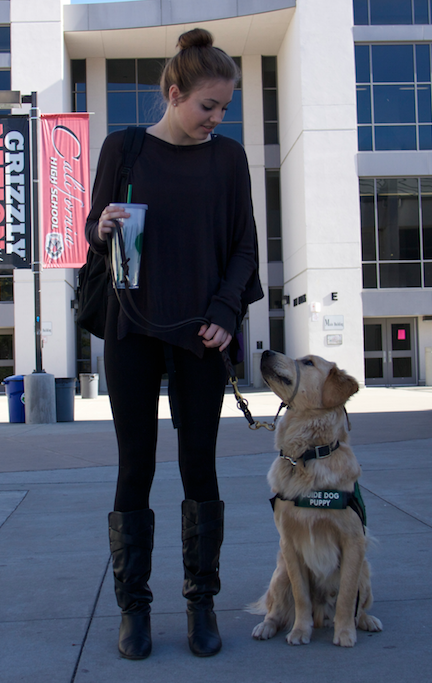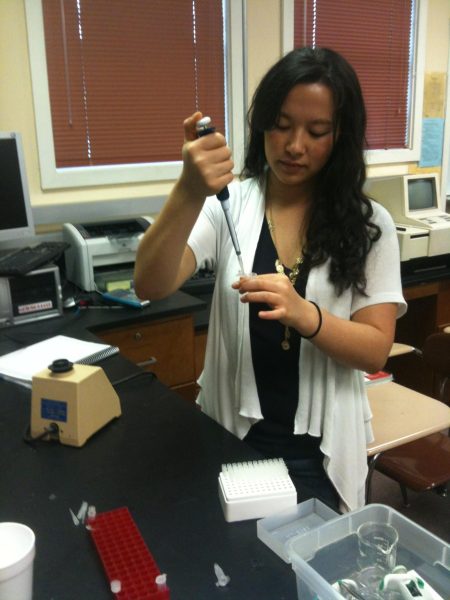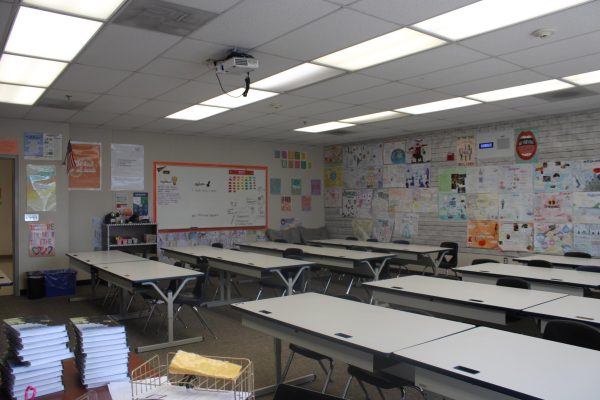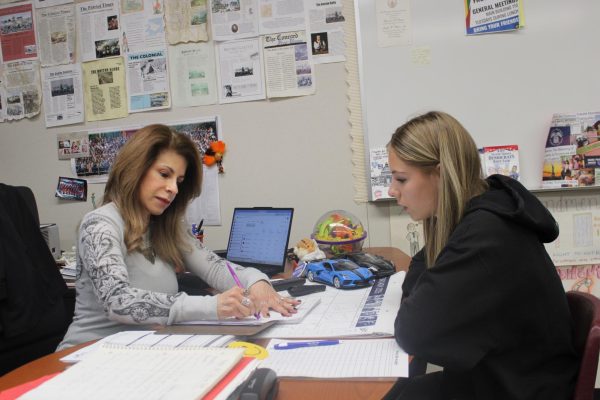Two senior girls training guide dogs
Jennifer Kutzler, Niamh Horn prepare puppies for the organization Guide Dogs for the Blind
When seniors Jennifer Kutzler and Niamh Horn go to school each day, they not only bring a backpack to campus but a puppy as well.
That’s because these two Cal High girls are volunteers for Guide Dogs for the Blind (GDB), a nonprofit organization that allows volunteers to help train service dogs who will later assist the visually impaired.
Through this organization, volunteers receive and raise a young puppy by helping it socialize, and learn good manners and basic obedience.
Kutzler and Horn take their dogs with them everywhere they go, including to school.
In order to bring their companions onto Cal’s campus though, they had to get approval from the San Ramon Valley Unified School District.
Their dogs each have a district-approved “puppy pass,” a visitor pass for canines signifying that they don’t come to school to play but come to continue their obedience training with their trainers.
Trainers such as Kutzler and Horn bring their canines to various places to get them used to new environments and different social interactions so the guide dogs can safely guide their future visually impaired partner without being distracted or scared.
Kutzler’s guide-dog-in-training is a female yellow lab named Bebe, a spunky 10-month-old pup with a fun personality. Kutzler said at-home Bebe is just an average puppy, playful and at times a bit of a troublemaker, too.
Although Bebe is a playful and affectionate dog at home, when working she shows promising skills as a future guide dog.
“Once we put her vest on, she’s like a completely different dog,” Kutzler said.
This is Kutzler’s first year volunteering as a trainer for GDB. She had wanted to train a guide dog ever since she had read a book about it in the third grade, but didn’t have the time to start until recently.
As Kutzler’s mother is also a certified trainer herself, Kutzler has strong support and encouragement from her parents.
“I love that Jenny wanted to raise a guide dog,” her mother Linda Kutzler wrote in an email. “I think the best part is raising a puppy to help someone one day.”
Kutzler has had Bebe since March, but she expects to be giving her back around May or June of 2016.
After the dogs turn about 15 to 17 months old, they are recalled by the organization to receive formal training.
Horn is currently training a one-year-old male golden retriever named Sanjay. He’s a very laid back and sweet puppy who is energetic at home but very calm and obedient during training.
Horn was first introduced to the guide dog training program through a friend and eventually started training her first guide dog in 2012. Sanjay will be the third dog she has successfully trained.
Horn also has lots of experience in bringing dogs onto Cal’s campus. She first brought a guide dog to school two years ago during her sophomore year, and has been bringing them to Cal ever since.
Like Kutzler, Horn has wholehearted support from her parents as well. Her mother is the leader of the San Ramon Valley guide dog raising club, and is very committed to raising guide dogs herself.
Horn has trained Sanjay since January, and expects him to be recalled around April or May.
Trainers treat their dogs like any other puppy, but there are a few notable differences.
For example, the guide dogs have different approved toys. They can’t play with balls, have stuffed animal toys, or play fetch because it teaches them bad habits and promotes their natural hunter instinct, which is not encouraged for guide dogs.
The dogs also can’t be petted when they are working, so when students or other people ask to pet the pup, trainers have to politely refuse this request.
Raising a dog can be expensive as well. GDB fortunately pays for trips to the vet and provides flea treatments and Heartgard chews to protect against heartworms.
Some dogs are also sponsored by organizations or companies. Kutzler’s dog Bebe is sponsored by the clothing company Bebe, who has donated $15,000 to GDB.
Their duties as guide dog trainers prove to be pretty time-consuming too, as there are weekly club meetings to attend and lots of training techniques to learn and practice. This isn’t a part-time job either, as it demands a lot of their devotion and attention.
“It’s a lot of work because you have to be around them a lot of the time,” Horn said. “I had to balance everything that was going on.”
Regardless of all the responsibilities that come with raising guide dogs, Kutzler and Horn agree all the work is definitely worth it in the long run.
“I’m doing this for someone who really needs it,” Kutzler said.
Many people admire the girls for their diligence and dedication,.
Senior Megan Molloy, Kutzler and Horn’s classmate, is among the numerous admirers of the girls’ volunteer work.
“I absolutely love it,” Molloy said. “I think it’s really great but it takes a lot of attention that I don’t think I have.”
As they train the pups, Kutzler and Horn keep the mindset that it’s not their dog but someone else’s future dog they’re raising. This helps make it a little easier when they have to part ways when the training period ends and the dogs are recalled.





